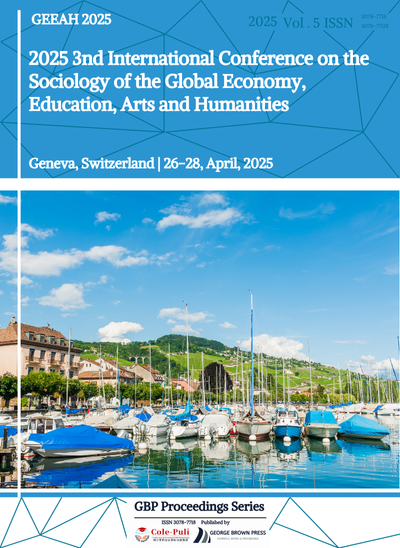Soft Resilience in Urban Governance
DOI:
https://doi.org/10.71222/1c2rph56Keywords:
urban resilience, public administration perspective, soft resilienceAbstract
From the perspective of public administration, this paper reconstructs the "soft resilience" framework within urban resilience theory, breaking away from the traditional focus on physical infrastructure. It highlights the critical role of social, cultural, and institutional factors in enhancing urban adaptability. Through interdisciplinary integration, this paper introduces complexity theory, multi-dimensional value balancing in policy-making, and adaptive management models, systematically exploring flexible policy adjustments and feedback mechanisms in dynamic environments. It reveals the coordinating and driving role of public administration in building urban resilience. "Soft resilience" is conceptualized as a dynamic adaptation process aimed at continuous learning, feedback, and optimization to strengthen cities' capacities to confront globalization, climate change, and social uncertainties. By constructing participatory mechanisms, fostering cross-sector collaboration, and strengthening social capital, public administration emerges not merely as a crisis manager but as a fundamental driver of institutional transformation and urban resilience.
References
1. N. Frantzeskaki, "Bringing transition management to cities: Building skills for transformative urban governance," Sustain., vol. 14, no. 2, p. 650, 2022, doi: 10.3390/su14020650.
2. N. Bautista-Puig, J. Benayas, J. Manana-Rodríguez, M. Suárez, and E. Sanz-Casado, "The role of urban resilience in research and its contribution to sustainability," Cities, vol. 126, p. 103715, 2022, doi: 10.1016/j.cities.2022.103715.
3. G. Yang, P. Zhang, F. Yu, and X. Zhu, "A review on resilient cities research from the perspective of territorial spatial planning: a bibliometric analysis," Front. Ecol. Evol., vol. 11, p. 1300764, 2023, doi: 10.3389/fevo.2023.1300764.
4. B. Wei, T. Yuchun, M. Tingting, et al., "Review on resilience management of urban infrastructure systems," J. Saf. Sci. Technol., vol. 31, no. 6, pp. 14–28, 2021, doi: 10.16265/j.cnki.issn1003-3033.2021.06.003.
5. X. You, Y. Sun, and J. Liu, "Evolution and analysis of urban resilience and its influencing factors: a case study of Jiangsu Province, China," Nat. Hazards, vol. 113, no. 3, pp. 1751–1782, 2022, doi: 10.1007/s11069-022-05368-x.
6. R. Gallotti, P. Sacco, and M. De Domenico, "Complex urban systems: challenges and integrated solutions for the sustainability and resilience of cities," Complexity, vol. 2021, no. 1, p. 1782354, 2021, doi: 10.1155/2021/1782354.
7. C. Cartalis, "Toward resilient cities–a review of definitions, challenges and prospects," Adv. Build. Energy Res., vol. 8, no. 2, pp. 259–266, 2014, doi: 10.1080/17512549.2014.890533.
8. J. Yang, P. Zheng, and Z. Chai, "Responding to extreme weather with innovative urban social governance mechanisms driven by complex adaptive systems theory: The 7.20 Zhengzhou flood," preprint, 2023, doi: 10.21203/rs.3.rs-3386865/v1.
9. D. Olsson, "From technocracy to democracy: Ways to promote democratic engagement for just climate change adaptation and resilience building," Sustain., vol. 14, no. 3, p. 1433, 2022, doi: 10.3390/su14031433.
10. S. Nazif, M. M. M. Khoie, and S. Eslamian, "Urban disaster management and resilience," in Handb. Disast. Risk Reduct. Resil., Cham, Switzerland: Springer, 2021, pp. 157–185. ISBN: 9783030612771.
11. J. Hu, M. Yang, and Y. Zhen, "A review of resilience assessment and recovery strategies of urban rail transit networks," Sustain., vol. 16, no. 15, p. 6390, 2024, doi: 10.3390/su16156390.
12. T. McDaniels, "Four decades of transformation in decision analytic practice for societal risk management," Risk Anal., vol. 41, no. 3, pp. 491–502, 2021, doi: 10.1111/risa.13332.
13. A. Abdillah, I. Widianingsih, R. A. Buchari, and H. Nurasa, "Resilience-based governance: A public administration perspective and resilience agenda," Public Organ. Rev., pp. 1–21, 2025, doi: 10.1007/s11115-025-00834-z.
14. E. R. Tangsgaard, "Risk management in public service delivery: multi-dimensional scale development and validation," Int. Public Manag. J., vol. 25, no. 7, pp. 1005–1026, 2022, doi: 10.1080/10967494.2021.2004270.
15. X. Lu and Z. Han, "Emergency management in China: towards a comprehensive model?," J. Risk Res., vol. 22, no. 11, pp. 1425–1442, 2019, doi: 10.1080/13669877.2018.1476901.











